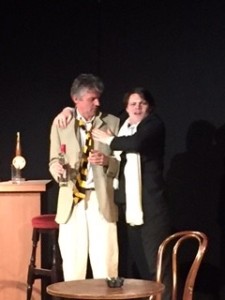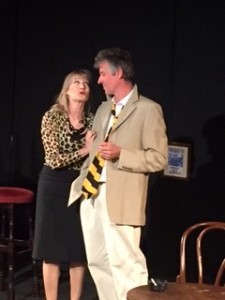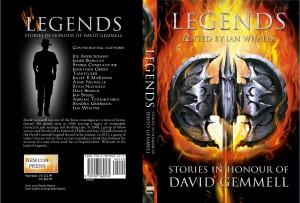Beware the risks of burn-out
NB: If this is TL:DR for you – head to the bullet points at the end of the piece. I won’t be offended.
Fatigue syndromes and their symptoms are not something specific to writers, but since I am one this is where I’m coming from. I saw a Tweet the other day and it really set the alarm bells ringing.
‘When you say it’s the weekend, every writer–from the freelancer to the successful novelist–is gearing up for a 48hr stretch of marathon anxiety and hopeful productivity.’
Unpacking this is ugly. It’s laced with suffering-to-succeed bullshit, it’s championing the false triumph of producing content over mental health and it’s implying (and wow, the high-fives in the replies to the tweet just back this up) that if you aren’t taking this trial of strength EVERY SINGLE WEEKEND you probably aren’t trying hard enough.
It is, of course, nonsense. And it’s dangerous nonsense too.
Don’t get me wrong, coming up to deadline on a project can mean all sorts of long hours and personal sacrifices. No problem. But every day, every weekend, every spare hour? You’re storing up problems for yourself.
While I’m at it, another caveat. I’m lucky: I get to write full-time, so I don’t have to cram my writing around my job, thereby making evenings and weekends critical for getting words on paper. But I did write my first six novels that way, getting cross when I couldn’t get a seat on the train as well, that sort of thing.
The point is, wherever you are on your journey as a writer, you have to take care, and be aware, of your emotional and mental wellbeing. Things like burn-out, fatigue and yes, I think writer’s block, if you want to call it that, don’t happen overnight. They creep up, they’re an incremental process of hollowing you out until you are unable to adapt any longer and things get horrible.
Here’s a story for you:
We’re all busy being beings
I’m typical of so many of us. Busy life, plenty to do. A family, dogs, a house and garden to maintain…so many bits and pieces perfectly common to many of us. I am in no way unusual or a special case. I try to keep office hours, for want of a better term. When the children are at school and the dogs walked, I can get to the office about 9.30am, work til 1pm, have lunch, back to work 2pm til 6pm. Good, right? A solid working day.
Of course, it’s not all pure work. It never is. Life intervenes at random. But I can’t, and refuse to, complain.
But, it’s never enough. It never has been. It wasn’t enough when I was writing on the tube and it isn’t enough today because there is always more to do. And that is the centre of the problem.
So, I’d do a day’s work, then all the other things I had to do because life happens anyway and if I got any other spare time, little by little, I found myself back at work.
So, what is relaxation, exactly?
I forgot how to relax. I remember laughing with my wife about that, about the fact that I wasn’t satisfied unless I was achieving something. Not funny, as it turns out. Even when I was reading a book it was haunted by work because it was research or a review copy or I was keeping myself up to date with the genre. Everything was analysis. It was the same when I was watching a box set… I wasn’t enjoying it for what it was because I was judging script and performance, shot and direction because they might all inform something I was working on.
It all felt like fun, up to a point. Looking back now, the time I should have started to question what on earth I thought I was doing was when not constantly ‘achieving’, in whatever form I’d created that day, soured my mood. If I wasn’t stupidly busy, I was unhappy.
And I then fooled myself with an indefinable end-point beyond which I’d be able to do all those things you might associate with relaxation with a clear conscience. It would happen, I convinced myself, ‘when I am not so stupidly busy.’ Oh dear.
So, there’s the set up. There are the incremental steps that lead me to effectively attempt to work all the time and be quietly, or not so quietly, irritable when I wasn’t. And no defined end point.
By this time, I was long past the stage of recognising that I was tired and should take a break; or realising that the reason I felt I must work all the time was because I was being woefully inefficient and not doing my best work, not by a long way.
All fall down
The day the edifice crumbled began like any other: kids off to school; dogs walked; breakfast; head to the office; sit at the PC.
Nothing.
I was in the middle of a draft for a book sequel, today was a day for writing an action scene and I love action scenes. But that day, I simply couldn’t see how to write it. I couldn’t see how it would carry the impact, energy and excitement that it had to have. I’ve had blank days before and just shrugged my shoulders and waited for the moment to pass (‘ignored the warning signs’ would have been more accurate, because they became more and more frequent) but this felt different. Well, it did in hindsight.
Obviously, I managed to deny everything and went on, deciding to write a proposal and work on a short film script instead. Thing is, I couldn’t make headway on either of them, couldn’t think my way around the simplest problem.
It went on like this for a few days before I couldn’t pretend any longer and that was the moment, like with every admission, that the problem was faced and could be tackled.
First, I had no concentration. It wasn’t so much fractured as ground into dust. I could not settle on anything. It was horrible. It robbed me of my desire to write. It robbed me of knowing what to write.
Second, the pool of creativity, of ideas, was dry, the bed cracked and fissured. Now, I’m someone who has so many ideas tumbling through his head that writing them down is the only way to get them out; and I’ve often said that it is both blessing and curse but that having that well run dry would be scary. Let me tell you, if you’re a creative and your life is enriched with endless ‘what-ifs?’ and you wake up one day and find they’ve all gone, it is terrifying.
I felt like I was failing. It was a dark place to reach.
And now, the good news
The treatment is really good fun, once you accept you need it.
The first thing I did was stop. Just stop. There was an immediate hit of relief that I wasn’t staring at writing I should be doing but unable to progress, but it didn’t last long. Next, I needed distraction. Not walking in the park because that leaves the mind free to roam and hence to worry, but something to occupy the mind in splendid passive nonsense.
So, I bought a couple of games (Dishonoured 2 and Death of the Outsider if you must know) and played. And when I wasn’t playing, I watched cartoons (Phineas & Ferb and Futurama are perennial favourites). Or I read books. Not genre books or history books for now, anything else I wouldn’t normally pick up. Police procedurals and horror, for instance — stuff I’m not going to try and write (well, I don’t think so).
I don’t recall exactly how long I did this for, but it was over a week and it didn’t come without its challenges. There’s guilt, as you can imagine and there is anxiety because what if the ideas don’t start presenting themselves again? And, in the beginning, concentrating on any of these distractions was a trick in itself.
This was cold-turkey stuff, but it worked for me. The desire returned at its own pace and solutions to those formerly insoluble problems began to present themselves. But in a moment of rare insight, I realised I should on no account rush back in. Instead, I set specific and short hours of work and did distraction stuff in the interim. As an aside, that included walking the dogs in the park but singing rather than thinking about work; liberating indeed.
Today
In short, I feel better about my writing than I have in months, years even, telling me that this issue was long in the making. My confidence is back, my mind is alight with ideas and all the achievement-anxiety is gone.
The temptation, of course, is to assume it’ll never happen again and go merrily on. But once bitten and all that… so checks and balances are in place.
Basic hours of work as described above are fine – you should never worry about normal working hours, after all. But breaks are rigidly ‘enforced’…step away from the PC/phone/notepad and go read a book/watch telly. Then, at the end of the day, make sure it feels like the end. Close-down the PC, close the note pads and leave them in the office. I’ve found this particularly useful because the physical act of shut-down resets the mind away from work and into relaxation mode. As for weekends, well the PC never leaves its resting place now and the notepads sit atop it. Best place for them.
And finally…
What I fell into is an extreme example, but it serves as a warning to check yourself regularly, ask yourself if you are doing too much and raising your own ‘achievement-anxiety’ levels in the process. We all have days when we’re knackered but the moment it’s a regular interference, or your enjoyment of your craft is diminished, check yourself, don’t just plough on.
If you think you’re suffering Writer’s Block, are you? Perhaps you’re fatigued, burned-out, and need to step away. Perhaps that is Writer’s Block. Think about it, don’t lie to yourself that all is well when it transparently is not. And don’t work until bedtime or you won’t sleep properly and thus allow the vicious cycle to continue.
But no schedule you set yourself is perfect and you have to be fluid, naturally. So, if you’re on a roll, bloody hell, yes, carry on because the high from an amazing day writing until you’ve no more to give is wonderful. But conversely, if it’s a blood-from-a-stone day, don’t work beyond your ‘normal’ hours because you feel you need to achieve some self-imposed word-count or scene-ending goal. Think of it like this: the amazing days are insurance against the crap ones.
One last thought. It isn’t the actual burn-out that’s the most damaging bit. After all, it’s then that you have to stop and address things. It’s the months (years?) of run-up when you weren’t doing your best work, when you knew your quality was lacking and you knew you needed to do even more work to fix it, that have cost you. That’s why I say, be on the look out for the early signs.
TL:DR
Okay, you’re here because it’s a long piece. No problem. Here are the key points:
Warning Signs
- Burn-out is a pernicious condition you need to recognise before it stops you in your tracks.
- There is no badge of honour for continually working until you drop, so if that’s what you feel you must do, you should be concerned.
- If you’re starting to suffer a lack of concentration, examine why that is.
- If you’re feeling creatively hollow, worry why that is.
- If you’re plagued by the idea you must continually achieve targets you’ve set for yourself and there is little time to relax, you are storing up problems for yourself.
- If you’re looking forward to that time when you’ll be less busy, ask yourself if you’re ever going to get there.
- Hitting the wall is discombobulating and you’ll doubt yourself and your abilities. But…
Turnaround
- Don’t think it’ll be fine tomorrow after a good night’s sleep. If you’re feeling too fatigued/empty/lacking in desire to write, switch off immediately.
- It’s not going to be easy, but you need to stop working, even thinking about work, for a while. For me, it was over a week. You’ll question it, get anxious about it and think getting back to work would be a better plan. Resist. It’s only a week.
- Distraction is a great thing. I watched cartoons or played video games. Anything to stop your mind wandering back to work before you’re ready.
- Baby steps. When you’re ready, and you’ll know because you’ll want to write rather than feel you ought to, don’t pile the hours in. Build it up over the next weeks to what you know is a manageable level (i.e. some way short of where you were).
- Separate work space from relaxation space. When you’re done working, if you can, leave your laptop behind.
- Don’t fool yourself that, for instance, reading a book for review is relaxation, it isn’t. Same goes for reading back what you wrote today. These things are for work hours.
Keeping it right
- When you’re scheduling your work, be honest and realistic with yourself. I know it’s hard to say ‘no’ when you’re freelancing but you still have to care for your mind.
- If you’re writing around your day job, again, be realistic. For instance, try not to write up until lights out. You need time to come down after writing or you won’t sleep properly.
- If you’re having a great day, bugger the schedule and go for it until you drop. It’s a high you deserve and it’s insurance against…
- …having a crap day. Don’t push it because you haven’t met a self-imposed goal. Stop, relax, sleep.
- Be honest with yourself. Check in with yourself to make sure you aren’t creeping into old habits or starting to get achievement anxiety.
- Writing is wonderful. Writing is the core way we express ourselves. It empowers us, enables us, brings us joy, allows us to understand ourselves and our worlds. When any of those things start to drift away, if the joy should diminish, time to reset…
James Barclay
July 2018
















